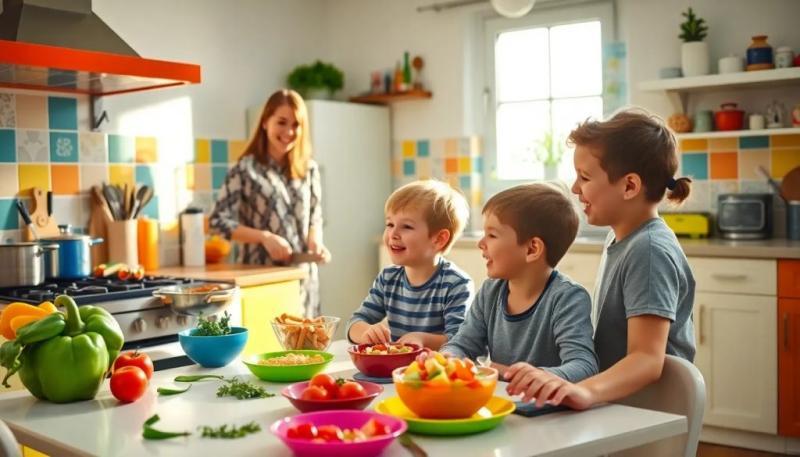When it comes to babysitting, many parents wonder about the food-related responsibilities that babysitters might have. While it is often thought that babysitters should prepare meals, the reality can vary based on several factors, including the family’s preferences and the specific situation.
This article dives into the various aspects of meal preparation, snacks, and the expectations surrounding food duties that babysitters may face. Understanding these responsibilities can help both parents and babysitters establish a clear framework for mealtime.
What food-related responsibilities might a babysitter have?
Babysitters often have a range of food-related responsibilities that can vary greatly depending on the needs of the children they are caring for. While many babysitters are not expected to cook elaborate meals, they may have to perform several tasks that involve food.
Common responsibilities may include:
- Opening packaged snacks for children.
- Preparing drinks for the kids.
- Cutting food into manageable pieces.
- Reheating leftovers from previous meals.
- Occasionally preparing simple meals.
These tasks help ensure that children are fed and satisfied while under the babysitter's care. However, it’s essential that babysitters communicate with parents about dietary restrictions to avoid any misunderstandings.
Should babysitters provide their own snacks?
The question of whether babysitters should bring their own snacks can depend on the family's expectations. In most cases, babysitters are not required to provide their own food, but doing so can show thoughtfulness and initiative.
Bringing snacks can be a great way to connect with the children, especially if they share the treats. However, babysitters should always check with the parents beforehand to ensure that the snacks comply with any dietary needs or preferences.
In general, if a babysitter chooses to bring snacks, it is helpful to keep in mind:
- Healthy options are often preferred.
- Check for food allergies among the children.
- Snacks should be easy to share and eat.
Can I give junk food like candy, soda, and chips to children I’m babysitting?
While it may be tempting to treat children to candy, soda, or chips, it's crucial to consider the parents' preferences first. Many parents have specific rules regarding junk food, and it’s important for babysitters to adhere to those guidelines.
Nonetheless, if parents allow occasional treats, babysitters can use this as an opportunity to create a fun atmosphere. However, it's wise to keep moderation in mind to maintain a healthy balance in children’s diets.
Here are some tips for handling snacks:
- Always ask parents about their rules for snacks.
- Encourage healthy options alongside treats.
- Be aware of the children’s preferences.
Do you prefer your babysitter to cook?
Many parents have differing opinions on whether they would prefer their babysitter to cook. Some may appreciate the assistance, while others might feel uncomfortable with someone else preparing meals for their children.
Families with strict meal plans may want babysitters to stick to reheating meals or preparing simple snacks rather than cooking from scratch. It's essential for babysitters to understand the family's expectations upfront to ensure everyone is on the same page.
For babysitters, being flexible and open to communication is key. Some families may appreciate a babysitter who can whip up a quick dinner, while others may prefer to keep meal prep strictly to them.
How to prevent parental burnout with meal prep?
Meal prep can significantly reduce the stress parents feel, especially when they have busy schedules. By setting up a system for meal preparation, parents can ensure they are providing healthy meals without the added pressure of daily cooking.
Some strategies to consider include:
- Batch cooking on weekends to save time during the week.
- Creating a meal plan that includes input from the whole family.
- Encouraging babysitters to assist in preparing meals when appropriate.
By implementing these strategies, parents can alleviate some of the burden associated with preparing meals every day, thus preventing burnout and ensuring they can focus on spending quality time with their children.
What are some easy meals for babysitters to make?
When it comes to meals that babysitters can whip up, simplicity is key. Here are some easy dinner ideas for babysitters:
- Macaroni and cheese: A classic favorite that requires just boiling pasta and mixing in cheese.
- Quesadillas: Quick and customizable, they can include cheese, beans, or other fillings.
- Frozen pizza: An easy option that can be baked quickly and appeals to kids.
- Veggie stir-fry: Fast to prepare, and packed with nutrients, especially if using pre-cut veggies.
- Sandwiches or wraps: Simple to assemble, and can include a variety of fillings.
These meals are easy to prepare, and babysitters can often involve the children in the process, making it a fun bonding experience.
Are there any make-ahead meals for babysitters?
Make-ahead meals can be a lifesaver for babysitters. Preparing meals in advance not only saves time but also ensures that children have nutritious options on hand. Some make-ahead meal ideas include:
- Overnight oats: A healthy breakfast option that can be customized with fruits and nuts.
- Casseroles: These can be made in advance and simply heated up when it’s meal time.
- Soup or chili: These dishes store well and can be easily reheated throughout the week.
By utilizing make-ahead meals, babysitters can provide healthy options without the added stress of daily cooking.
Related questions about babysitting and food responsibilities
Common inquiries regarding babysitters and their meal responsibilities
Do babysitters have to cook?
Generally, babysitters are not required to cook. Their primary focus is on childcare and ensuring the safety and well-being of the children. However, they may assist in preparing simple meals or reheating food as needed. It’s important for parents to set clear expectations regarding cooking responsibilities.
What services do babysitters provide?
Babysitters provide a range of services that go beyond just watching children. These can include preparing snacks, assisting with homework, engaging in play, and sometimes cooking simple meals. Parents should communicate their specific needs to ensure babysitters understand their expectations.
What should a babysitter not do?
Babysitters should avoid making decisions that could conflict with the parents' rules. This can include giving children junk food without permission, changing established routines, or failing to communicate issues that arise. Maintaining an open line of communication with parents is essential for a successful babysitting experience.
What are the three biggest responsibilities of a babysitter?
The three primary responsibilities of a babysitter include ensuring the safety of the children, engaging them in meaningful activities, and adhering to any guidelines set by the parents, particularly around meals and snacks. By focusing on these areas, babysitters can create a positive environment for the children.
Understanding the various responsibilities surrounding food can greatly enhance the babysitting experience for both the caregiver and the children. Communication is key in setting expectations, ensuring a smooth process, and making mealtimes enjoyable.
En este contexto, te presentamos un video que explora si las babysitters también cocinan comidas y qué aspectos considerar al respecto.




